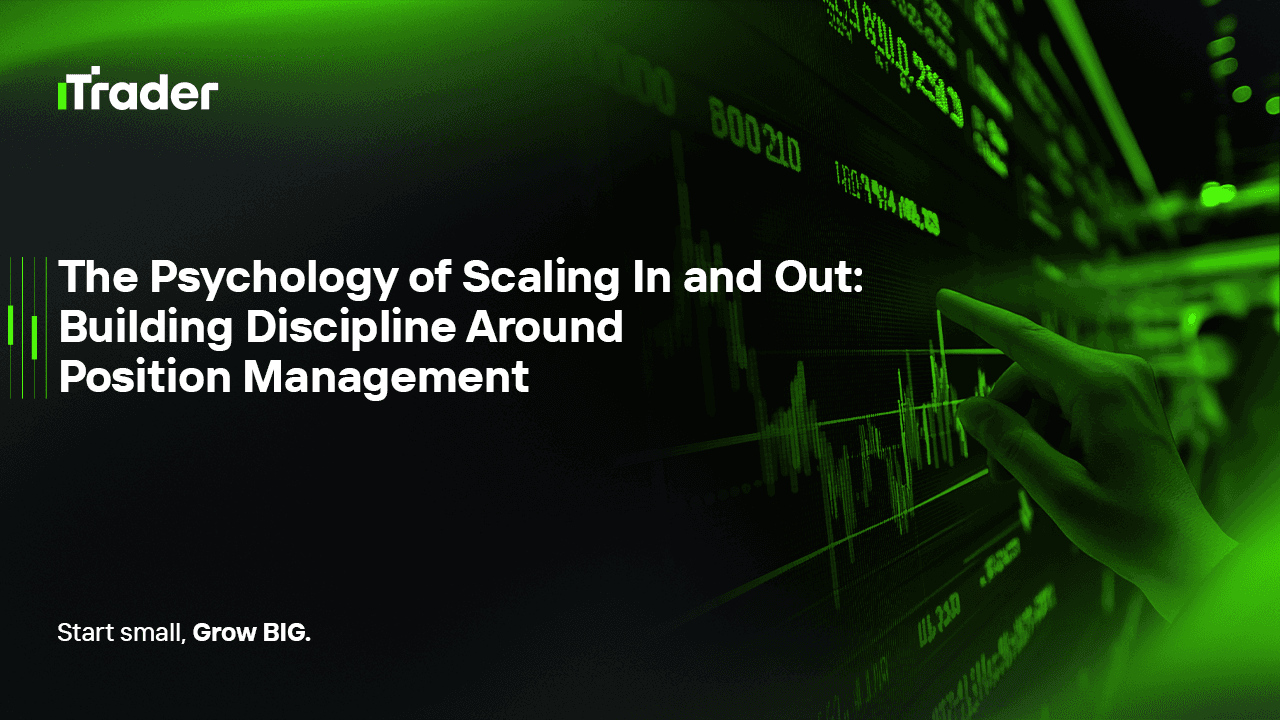2025-09-23
Ask any trader what matters most, and many will say “finding the perfect entry.” But if you’ve been trading forex long enough, you know the truth: the entry is only the beginning. The real battle starts after you’re in the trade.
This is where position management comes in. It’s the art—and discipline—of adjusting your exposure as the trade unfolds. Do you add more when the market is moving in your favor? Do you reduce size to protect profits? Or do you freeze, second-guess, and end up turning a good trade into a missed opportunity?

The answers lie in how well you apply two powerful techniques: scaling in and scaling out. Done right, they can transform your equity curve. Done wrong, they can sabotage even the best setups.
Let’s break them down, not just technically, but from the psychological perspective that often separates winning traders from inconsistent ones.
At its core, position management is about controlling your size, risk, and profit distribution as the market evolves.
Sounds simple, right? The reality is far from it. The mechanics are easy—the psychology is not. That’s why so many traders either misuse these tools or avoid them altogether.
Scaling in is about pressing your advantage. Instead of throwing all your capital in at once, you start small, and only increase size when the trade proves itself.
For example:
Greed creeps in fast here. Many traders confuse scaling in with averaging down—adding to losers in the hope of recovery. That’s not scaling in; that’s gambling. True scaling in happens only when you’re already ahead.
Another common pitfall: over-adding. A trade moves slightly in your favor and you pile in aggressively, only to get shaken out by a minor pullback. Discipline is what keeps scaling in a weapon, not a liability.
Scaling out is about reducing exposure as the trade matures. Instead of closing everything too early or holding everything too long, you strike a balance.
Example:
The danger with scaling out is doing it too early. If you close half the position for peanuts, you rob yourself of the trade’s true potential. On the flip side, refusing to scale out at all can mean watching a winning trade reverse and wipe out your gains.
The skill lies in defining clear rules: when, how much, and under what conditions to scale out. Without that framework, emotions take over.
The technical rules are easy to write down. The execution is another story.
Here’s what tends to go wrong:
To counter this, you need structure:
A trader buys EUR/USD with 1 lot, stop 50 pips. After +50 pips in profit, they add 0.5 lot. At +100 pips, they close the initial 1 lot, trail the remaining 0.5 lot, and secure a total of +3R.
The key? They only added after confirmation and managed risk carefully.
Another trader buys 1 lot. The trade drops 40 pips against them. Instead of taking the stop, they add another 1 lot to “average down.” When the stop hits, the loss is double what they planned.
That’s not position management—it’s emotional trading disguised as strategy.
Here’s how to bring discipline to scaling in and out:
Trading is a probability game. A single trade means nothing. What matters is how your equity curve looks after 100, 200, or 500 trades.
Scaling in and out, applied with discipline, smooths that equity curve. It reduces volatility in your results, protects you from emotional swings, and lets you compound gains more effectively.
The traders who succeed aren’t the ones who catch one big move—they’re the ones who stay in the game long enough for their edge to play out. Position management is what keeps you in the game.
Scaling in and scaling out are more than just trade management tactics. They are mirrors that reveal your psychology.
With clear rules and discipline, these tools transform you from reacting emotionally to trading with intent. They don’t just help you manage positions—they help you manage yourself.
That’s the real edge.
2025 Ай Трейдер Глобал ХХК | Компанийн бүртгэлийн дугаар: 15962
Ай Трейдер Глобал ХХК нь Комор улсын Анжуан арал дахь Мутсамуду хотын Хамчакод байрлалтай. Тус компани нь Коморын Үнэт Цаасны Хорооноос (Securities Commission of the Comoros) олгосон L15962/ITGL дугаартай тусгай зөвшөөрлийн хүрээнд үйл ажиллагаа явуулдаг.
Ай Трейдер Глобал ХХК нь “iTrader” нэрийн дор үйл ажиллагаа явуулдаг бөгөөд (Форекс) арилжааны үйл ажиллагаа явуулах эрхтэй. Компанийн лого, барааны тэмдэг, вэбсайт нь зөвхөн Ай Трейдер Глобал ХХК компанийн өмч юм.
Ай Трейдер Глобал ХХК -ийн охин компани болох : iTrader Global Pty Ltd, Австралийн компанийн бүртгэлийн дугаар (ACN): 686 857 198. Энэ компани нь Opheleo Holdings Pty Ltd компанийн албан ёсны төлөөлөгч бөгөөд Австралийн санхүүгийн үйлчилгээний төлөөлөгчийн дугаар: 001315037 -тай. Австралийн санхүүгийн үйлчилгээний лицензийн дугаар: 000224485 -тай Level 1, 256 Rundle St, Adelaide, SA 5000 хаягт байршдаг. Анхааруулга: Энэ байгууллага нь энэхүү вэбсайт дээр болон дамжуулан арилжаалагдаж буй санхүүгийн (арилжааны) хэрэгсэл нийлүүлэгч биш бөгөөд ямар нэгэн хариуцлага хүлээхгүй болно.
Эрсдэлийн сэрэмжлүүлэг: CFD арилжааны хөшүүргийн улмаас хөрөнгөө хурдан алдах өндөр эрсдэлтэй тул бүх хэрэглэгчдэд тохиромжгүй байдаг.
Фанд, CFD болон бусад өндөр xөшүүрэгтэй арилжаа нь хэрэглэгчээс нарийн төвөгтэй ойлголтуудын талаар тусгай мэдлэг шаарддаг. Хөшүүрэгтэй арилжаанд оролцогчдын 84.01% нь алдагдал хүлээдгийг судалгаанууд харуулдаг тул хөшүүрэгтэй арилжаанд орохоос өмнө хөрөнгөө алдах маш өндөр эрсдэлтэй болохыг анхаарна уу.
iTrader нь аливаа иргэн, хуулийн этгээдийн өмнө xөшүүрэгтэй арилжааны эрсдэл, алдагдал, бусад хохирлыг бүхэлд нь хариуцахгүй болохыг мэдэгдэж байна.
Энэхүү веб сайтын мэдээ, мэдээлэл нь зөвхөн мэдлэг түгээх зорилготой тул хэрэглэгч та бие даан шийдвэр гаргана уу.
Хязгаарлалт: iTrader нь вэбсайт болон үйлчилгээгээ тухайн орны хууль тогтоомж, дүрэм журмаар хориглосон орнуудад оршин суугчдад чиглүүлдэггүй. Хэрэв та энэхүү вэбсайтыг ашиглахыг хориглосон оронд байгаа бол вэбсайт болон үйлчилгээг ашиглахдаа тухайн орны хууль тогтоомжид нийцэж байгаа эсэхийг шалгах үүрэгтэй. iTrader нь вэбсайтынхаа мэдээлэл бүх оронд тохиромжтой эсэхийг баталгаажуулдаггүй.
Ай Трейдер Глобал ХХК нь зарим улс орны иргэдэд үйлчилгээ үзүүлэхээс татгалздаг болно. Жишээлбэл: АНУ, Орос, Бразил, Канада, Израйл, Иран.